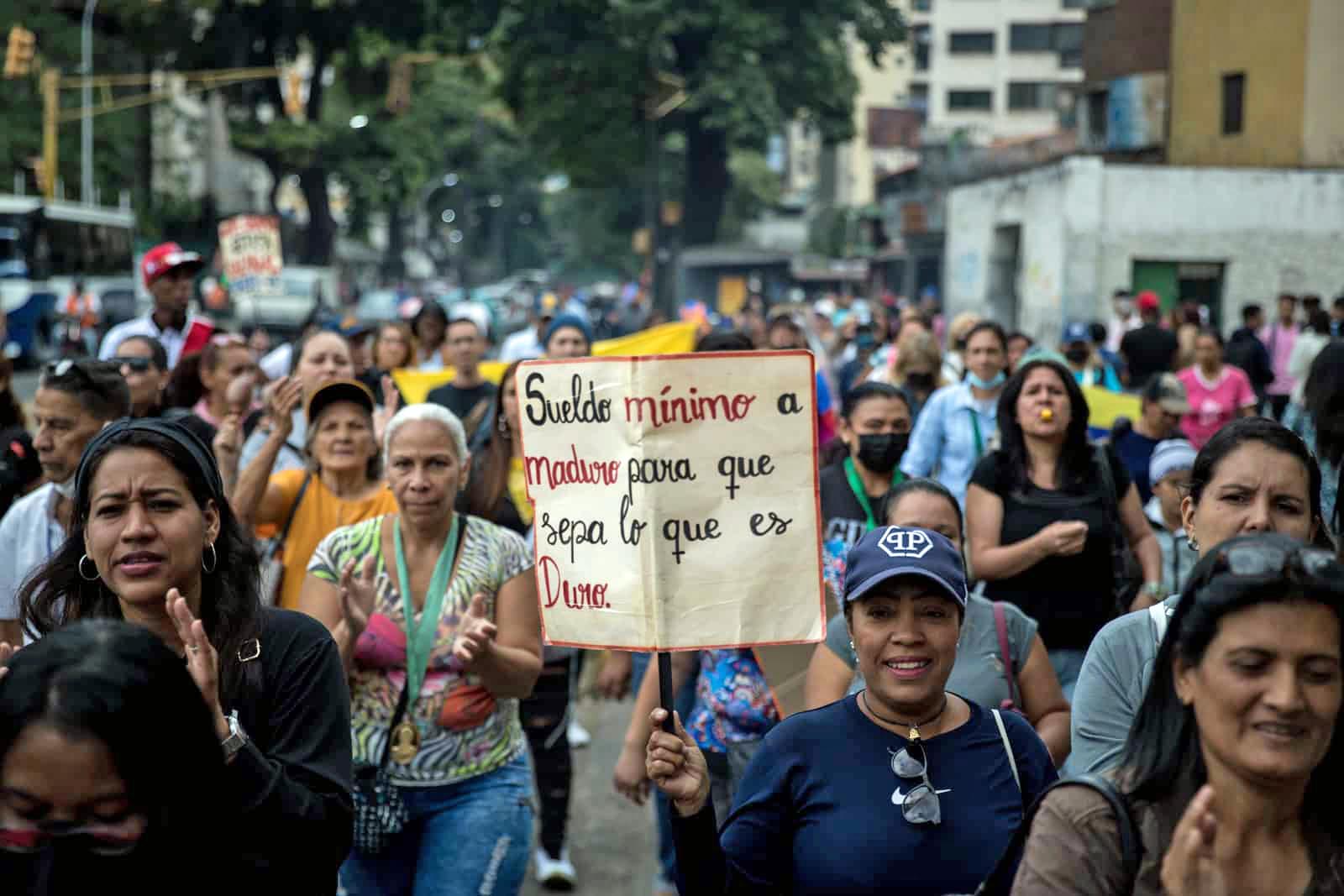The only Way Out for the Proletarians: Class Struggle
(«Proletarian»; Nr. 20; Autumn-Winter 2023)
Since January of this year (2023), strikes and street demonstrations have multiplied in Venezuela, mainly organized by education workers. The slogans of the demonstrations revolve around wages: «The dollar rises, wages fall, hunger intensifies»; «And you, Maduro, workers’ president, how much do you earn?»; «Hunger wages, pensions that kill».
And it is no wonder: according to Bloomberg, the real minimum wage in Venezuela was $8 in December 2022 and did not exceed $6 (!) in January 2023, by far the lowest in Latin America. Added to this is hyperinflation, which according to government figures is 234%, incomparable to 2018 when it reached 130,000%, but still remains the highest in the world after Sudan. On the other hand, the World Bank estimates that people surviving on less than $2.15 a day live in extreme poverty… There are no words for this.
As for the government, it promotes the idea that «Venezuela is recovering», but according to economist M. Sutherland, «if Venezuela were to grow at the same rate Maduro says it did in 2021, i.e. 5%, it would take 32 years to return to the economy of 2013». This recovery is unlikely to reach the poorer sections of Venezuelan society. According to Encovi-Venezuela (Encuesta Nacional sobre Condiciones de Vida), quoted by the New York Times, «…for the first time in seven years, poverty is declining: half the country lives in poverty, down from 65% in 2021». As the North American newspaper illustrates, «many survive on the equivalent of a few dollars a day, and public sector workers have taken to the streets to protest low salaries»… But the investigation, again according to the NY Times, also revealed that «the richest Venezuelans are 70 times richer than the poorest, putting the country on par with some countries in Africa that have the highest levels of inequality in the world».
 This horrendous
inequality is one of the conditions demanded by the bourgeois institutions,
especially the United States, for Maduro’s government to remain in power, amid a
tenuous social peace that cannot be compared to that of three years ago. This is
the fundamental reason for the disintegration of the bourgeois opposition, which
in December abandoned its puppet, the «self-proclaimed president» Guaidó, who
had become more unpopular than Maduro, in particular, because of the fraudulent
management of the resources provided by the European Union and the United
States. It could not have been otherwise!
This horrendous
inequality is one of the conditions demanded by the bourgeois institutions,
especially the United States, for Maduro’s government to remain in power, amid a
tenuous social peace that cannot be compared to that of three years ago. This is
the fundamental reason for the disintegration of the bourgeois opposition, which
in December abandoned its puppet, the «self-proclaimed president» Guaidó, who
had become more unpopular than Maduro, in particular, because of the fraudulent
management of the resources provided by the European Union and the United
States. It could not have been otherwise!
The protests surprised the government and the demonstrators themselves, who, having been called, did not expect so many workers on the streets. But the discontent is spreading: in the city of Ciudad Guyana, the country’s main centre of heavy industry, which is now suffering from a decline in production due to a lack of resources to ensure maintenance and modernization, workers from Sidor, the main company in the hands of the Chavista state, took to the streets and, with the help of workers from other industries in the region, demanded better wages and respect for the conquests enshrined in contracts. A dozen worker militants were arrested and charged with sedition (the whole of southeast Venezuela is declared a «security zone»), but thanks to pressure from the workers they were soon released. The health sector, whose resistance has defended the honor of the proletarians of this country for several years, was also mobilized, as were oil workers, civil servants and pensioners, for the same reasons: hunger and poverty.
On January 12th, this whole mass of protesters expected to hear from President Maduro, in his annual message, a positive response to their demands. But he limited himself to stating that he could not yet raise the minimum wage because of the «blockade», that is to say, the 900 economic sanctions imposed on the Caribbean country by the US; it must be said, however, that these sanctions and the pressure on Caracas have been reduced, so that it is possible to trade in more oil, which is Venezuela’s main source of foreign currency. These sanctions have undoubtedly hit Venezuela’s economic capacity and potential hard, forcing the government to take measures at the expense of the vast majority of the population. «We are aware of this and we are acting,» Maduro said…
Still on 23 January, the anniversary date of the celebration of democracy in Venezuela, the aforementioned workers’ sectors once again took to the streets by the thousands throughout the country. There were no injuries, deaths or arrests, but there was a large-scale mobilization of the security forces to prevent the protesters from passing through, and threats and counter-demonstrations by the chavista sectors calling for the defense of the fatherland against the imperialist yoke: Chavista demonstrations declared themselves to be an «anti-imperialist revolt», which constitutes a vulgar blackmail, as if one should suffer hunger and hardship in the name of the fatherland…
In this complex and difficult situation, where the Venezuelan bourgeoisie is enriching itself with the consent of a party that calls itself socialist, and the proletarians are extremely impoverished, demonstrations, work stoppages and strikes are a good sign that we must welcome, because they can be a step on the road to the salvation of the proletarians: the class struggle.
March, 24th 2023